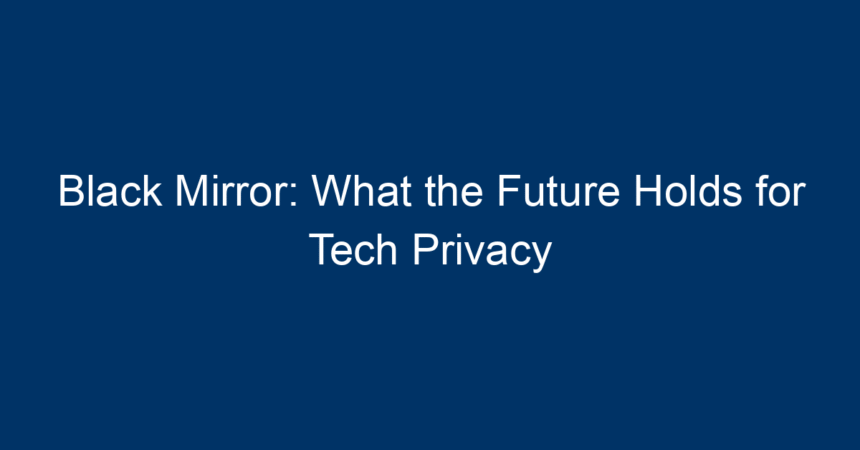In a world increasingly dominated by technology, questions regarding privacy sit at the forefront of societal discourse. With advancements occurring at an unprecedented pace, the dystopian realities depicted in the Netflix anthology series Black Mirror become alarmingly relevant. Each episode offers a mirror reflecting our reliance on technology and its implications for our privacy, autonomy, and humanity. This article delves into the themes presented in Black Mirror, explores the potential futures for tech privacy, and offers actionable insights for individuals and organizations alike.
The Allure and Anxiety of Technology
Understanding Black Mirror
Black Mirror is renowned for its thought-provoking narratives that probe into how technology could evolve and impact human life. The anthology series uses sci-fi elements to present chilling tales where technology enhances life while simultaneously eroding privacy. From the social media-driven lives in "Nosedive" to the all-seeing surveillance in "Fifteen Million Merits," each story serves as a cautionary tale, prompting viewers to question the implications of their technological choices.
The Human Experience and Tech
Humanity’s relationship with technology is complex. It brings convenience, connectivity, and innovation—but at what cost? As Black Mirror episodes often illustrate, overreliance on tech can lead to a loss of daily privacy, intimacy, and even moral ground. The tensions between progress and privacy are central themes that demand our attention.
The Current State of Tech Privacy
Surveillance Capitalism: The New Norm
In today’s digital landscape, surveillance capitalism reigns supreme. Big tech companies monetize user data, often without users’ explicit consent or understanding. This trend echoes Black Mirror‘s portrayal of a world where personal data is currency, leading to the commodification of human experience.
Data Breaches and Privacy Violations
Data breaches have become a common occurrence. Recent incidents involving major companies have compromised the privacy of millions. These breaches not only undermine consumer trust but also showcase the vulnerabilities inherent in storing vast amounts of personal data. Such scenarios resemble the chilling tales from Black Mirror, where individuals’ lives can spiral out of control due to lost data privacy.
Tech Advances Versus Privacy Concerns
The Double-Edged Sword of AI
Artificial Intelligence (AI) has the potential to transform our lives, offering personalized experiences that cater to our needs. However, as Black Mirror illustrates, AI also raises deep ethical questions. For example, predictive algorithms can lead to profiling that violates personal boundaries and introduces bias. The question remains: how can we harness AI while safeguarding our privacy?
The Role of Social Media
Social media platforms have revolutionized communication but also created unprecedented privacy dilemmas. As seen in "Nosedive," where social status is tied to public ratings, social media can lead to anxiety, bullying, and a loss of genuine interaction. Tech companies frequently change privacy policies, often to the detriment of user understanding.
The Dark Side of Connectivity
Dystopian Futures in Black Mirror
The series offers various dystopian visions of the future, where privacy is an illusion. In "White Christmas," for instance, characters face extreme punishments for their digital existence. Such narratives provoke deep reflection about our societal trajectory—what might happen if we ignore the boundaries of privacy in pursuit of connectivity?
Real-World Examples
Real-world incidents echo these dystopian narratives. Consider China’s social credit system, which mirrors the social validation themes found in Black Mirror, where surveillance governs social behavior. This system raises alarm bells about how technology can extend its reach into individuals’ lives, influencing their opportunities and freedoms.
The Future: Where Are We Heading?
Emerging Technologies and Privacy Solutions
As we look to the future, emerging technologies will redefine privacy standards. Blockchain technology, for example, can offer decentralized data control—enabling individuals to manage their information without corporate interception. Efforts like this can create a buffer between personal data and the ever-intrusive data mining activities we see in Black Mirror.
Consumer Advocacy and Awareness
The future of tech privacy is not solely dependent on technological advancement; consumer awareness plays a crucial role. Organizations must prioritize privacy in their foundations while consumers need to educate themselves on data rights. Awareness campaigns can foster a culture that demands better practices, reducing the likelihood of Black Mirror-esque scenarios.
Actionable Insights for Individuals and Organizations
For Individuals:
- Educate Yourself: Knowledge is power. Understand the privacy policies of platforms you use.
- Use Privacy Tools: Incorporate virtual private networks (VPNs), encrypted messaging apps, and privacy-focused search engines.
- Limit Data Sharing: Be discerning about what personal information you share online.
For Organizations:
- Prioritize Privacy: Ensure that data privacy is an integral part of your business strategy.
- Engage in Transparent Practices: Provide clear information about how data is collected, used, and shared.
- Invest in Security Technologies: Utilize advanced security measures to protect consumer data and diminish breach risks.
Conclusion: A Reflection on Black Mirror and Our Paths Forward
As we continue to navigate the digital age, the reflections in Black Mirror provide a roadmap of caution and insight. The series crystallizes the potential pitfalls of our technological trajectory, urging us to reconsider our relationship with tech and privacy. The future of tech privacy is not set in stone; it will be shaped by our collective choices today. By fostering awareness and advocating for responsible practices, we can carve a path that ensures technology serves humanity without sacrificing our most cherished values—our privacy, freedom, and dignity.
As we venture forth, let the stories of Black Mirror serve as both a warning and a guide, reminding us that technology, while a tool for progress, must be wielded with care. We hold the power to shape our future; let’s ensure it’s one we can embrace rather than fear.
This article has examined the intricate relationship between technology and privacy through the lens of Black Mirror, while offering practical insights for individuals and organizations. Embracing these insights can help us create a balanced technological future that respects personal privacy.




